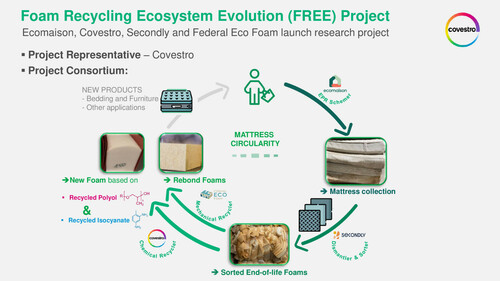Ecomaison, Covestro, Secondly and Federal Eco Foam launch research project
Material efficiency is the key objective when creating a new material cycle for flexible polyurethane (PU) foam from used mattresses. The French company Ecomaison has dedicated itself to collecting and recycling used furniture and has been working with Covestro for a few years to utilize its chemical recycling technology for this purpose. With this advanced process, both raw materials originally used can be recovered – the polyol as well as the precursor to the isocyanate TDI.
The aim of the partners is to recycle the sorted polyurethane foams as efficiently as possible by combining mechanical and chemical technologies after careful sorting by foam type in the mattress cutting plants.
Collaborations leveraging own expertises with like-minded partners are key: In addition to Ecomaison and Covestro, the French dismantling company Secondly and Federal Eco Foam, a Belgian specialist in the mechanical recycling of flexible foams, are involved as partners in the project, which is planned to run for a maximum of 24 months. The project is called Foam Recycling Ecosystem Evolution (FREE) and coordinated by Covestro and half-funded by Ecomaison.
For the FREE consortium, the motivation lies in the added value of the material that can be recovered from the used foams and the opportunity to enter a more sustainable circular economy. The partners want to explore all possibilities in a future-oriented foam recycling ecosystem and are convinced that chemical and mechanical recycling will complement each other in a meaningful way. As dismantler and sorting actor, Secondly is interested in empowering its sorting processes to be able to supply to recyclers a specified quality of foam.
At the same time, the project will provide a good picture of how the foam recycling market in the coming years may look like. The partners truly believe that chemical and mechanical recycling can be complementary given different specifications of inlet materials being sorted already at dismantlers. To provide added value to the PU foam material, the consortium will investigate all possibilities in a future oriented eco-system of foam recycling.
The research and development project includes the foam sorting at the dismantling step, as well as a comparative feasibility study for two recycling processes for the sorted foams covering economic and ecologic value co-creation.
A few years ago, Covestro and its partners developed a chemical recycling process that is the only one of its kind capable of ultimately recovering both main raw materials of flexible PU foams in high purity. The company also operates a pilot plant at the Leverkusen site for this purpose. Together with the waste management industry, the company wants to drive the process forward to industrial use.
To make its vision of a fully circular economy a reality, Covestro is making the development of innovative recycling technologies a priority and calls the evolution of recycling Evocycle® CQ. The chemolysis of PU mattress foam is the first initiative of Covestro of its kind and is called Evocycle® CQ Mattress.
Categories
Chemical substances
Countries
Companies
Latest news
MSSA doubles production capacity for sodium methylate in La Rochelle, France
The strategic investment will double MSSA's annual production capacity for sodium methylate from 20,000 tonnes to 40,000 tonnes, reinforcing the company's commitment to meeting the growing demand f...
Dreexo Energy to Launch Circular Economy Plant in Cádiz, Advancing Sustainable Industry in Andalucía
Construction of a new facility in the Cádiz Free Trade Zone. The project is expected to break ground in early 2026 and be operational by year’s end.
BASF invests in new semiconductor-grade sulfuric acid plant in Ludwigshafen, Germany
BASF SE, Ludwigshafen →Essential ultra-pure chemical enabling advanced semiconductor manufacturing processes New capacity meets growing demand for the manufacturing of chips in Europe
Vioneo appoints Wood to design world’s first industrial scale fossil-free plastics facility in Antwerp, Belgium
Port Of Antwerp →the renewably powered and energy efficient plant will be the first facility in the world capable of achieving the production of fossil-free plastics using green methanol at an industrial scale.

